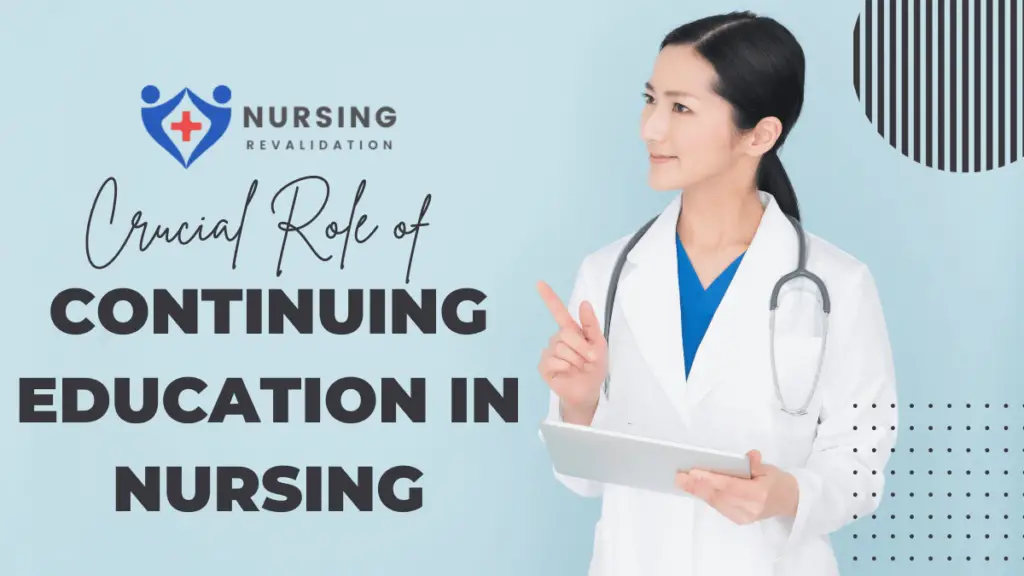In the dynamic field of healthcare, where advancements and best practices evolve continually, nurses serve as frontline caregivers, playing a pivotal role in patient outcomes and healthcare delivery. With the rapid pace of change, the importance of continuing education in nursing cannot be overstated. This comprehensive guide delves into the significance of ongoing learning for nurses, exploring its impact on patient care, professional development, and the broader healthcare landscape.
The Evolution of Nursing Education:
The Foundation of Nursing Knowledge
Nursing education has undergone significant transformations over the years, from the apprenticeship model to formalized academic programs. Today, aspiring nurses pursue rigorous education and training, culminating in licensure examinations to ensure competency. However, the journey doesn’t end with licensure; rather, it marks the beginning of a lifelong commitment to learning and growth.
Table: The Impact of Continuing Education on Nursing Practice
| Benefits of Continuing Education | Examples |
|---|---|
| Enhanced clinical knowledge | Mastery of evidence-based practice guidelines |
| Improved patient outcomes | Reduction in hospital readmission rates |
| Professional development | Attainment of specialized certifications |
| Career advancement | Transition to advanced practice roles |
| Regulatory compliance | Fulfillment of licensure renewal requirements |
Understanding Continuing Education:
Embracing Lifelong Learning
Continuing education in nursing encompasses a spectrum of activities designed to enhance knowledge, skills, and competencies beyond initial training. This ongoing process enables nurses to stay abreast of advancements in clinical practice, technology, and evidence-based interventions. From attending workshops and conferences to pursuing advanced degrees, nurses have diverse avenues for continuing education tailored to their interests and career goals.
The Impact on Patient Care:
Elevating Quality and Safety
Continuing education directly correlates with improved patient outcomes by ensuring nurses remain proficient in delivering high-quality care. Through ongoing learning, nurses acquire updated clinical knowledge and hone critical thinking abilities, enabling them to adapt to evolving patient needs and complex healthcare scenarios. Moreover, staying current with best practices and innovations enhances patient safety, reducing the likelihood of errors and adverse events.
Professional Development and Career Advancement:
Empowering Nurses for Success
Beyond its influence on patient care, continuing education empowers nurses to pursue professional growth and advancement. By acquiring specialized certifications or pursuing advanced degrees, nurses can expand their scope of practice, unlock new career opportunities, and command higher salaries. Additionally, ongoing learning fosters leadership skills and cultivates a culture of innovation, positioning nurses as change agents within their organizations.
Navigating Regulatory Requirements:
Compliance and Accountability
In addition to its intrinsic benefits, continuing education is often mandated by regulatory bodies to ensure ongoing competency and licensure renewal. Nursing boards and professional associations establish minimum requirements for continuing education credits, reflecting the industry’s commitment to upholding standards of practice and accountability. Adhering to these requirements not only fulfills regulatory obligations but also demonstrates a commitment to excellence in nursing practice.
The Role of Continuing Education in Addressing Healthcare Challenges:
Meeting the Demands of a Changing Landscape
In an era marked by demographic shifts, technological advancements, and public health crises, nurses face evolving challenges that demand continuous adaptation and innovation. Continuing education equips nurses with the knowledge and skills needed to address emerging healthcare issues, such as chronic disease management, cultural competence, and healthcare disparities. By investing in ongoing learning, healthcare organizations can bolster their workforce’s resilience and capacity to navigate complex healthcare landscapes effectively.
Conclusion:
As the backbone of healthcare delivery, nurses play an indispensable role in promoting patient well-being and advancing the broader healthcare agenda. In a rapidly evolving landscape, continuing education emerges as a linchpin for ensuring nurses remain competent, confident, and compassionate caregivers. By embracing lifelong learning, nurses not only elevate the quality of patient care but also position themselves for professional success and leadership. As we look to the future of nursing, the imperative of continuing education remains steadfast, underscoring its indispensable role in shaping the healthcare landscape for years to come.

